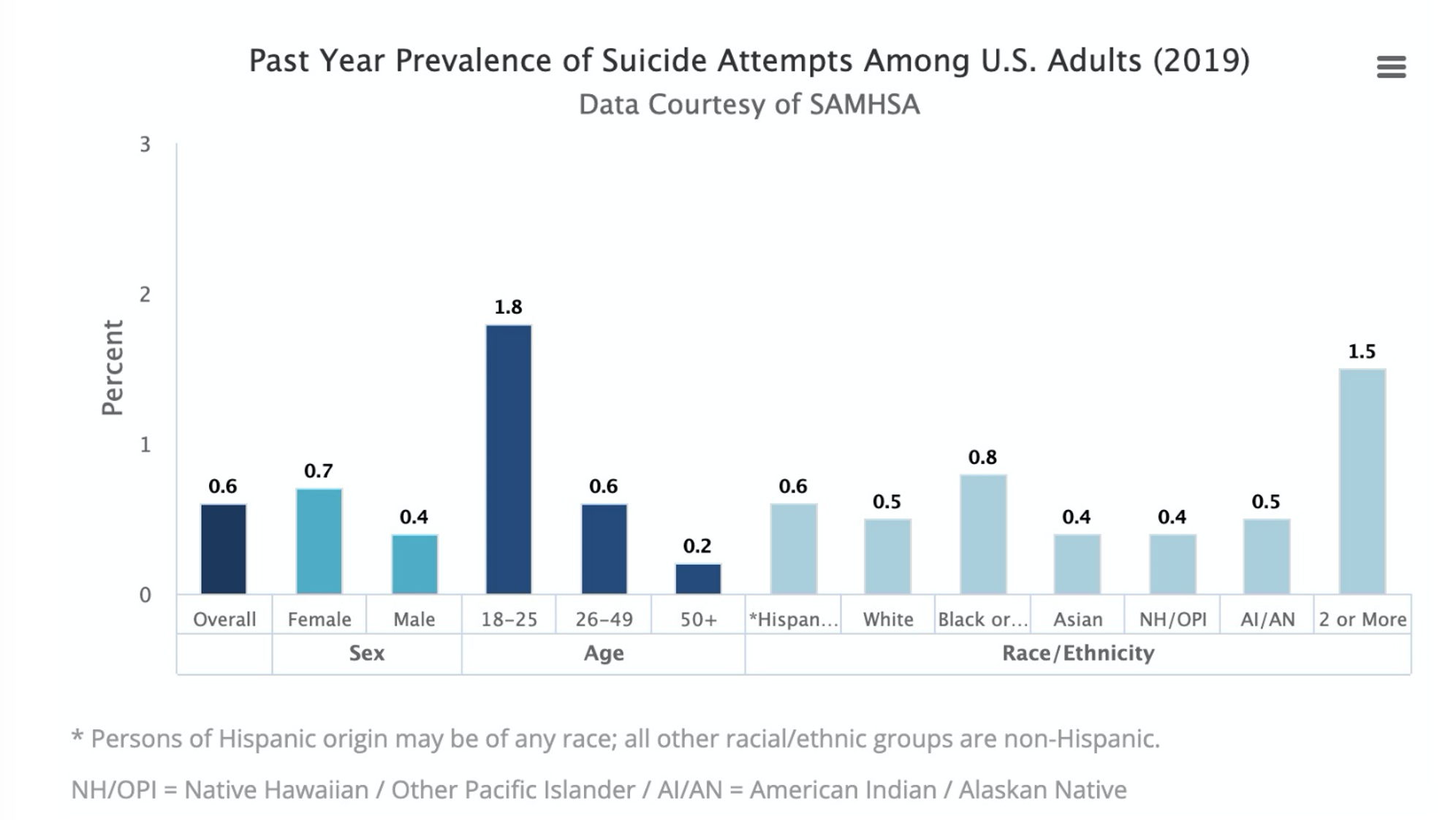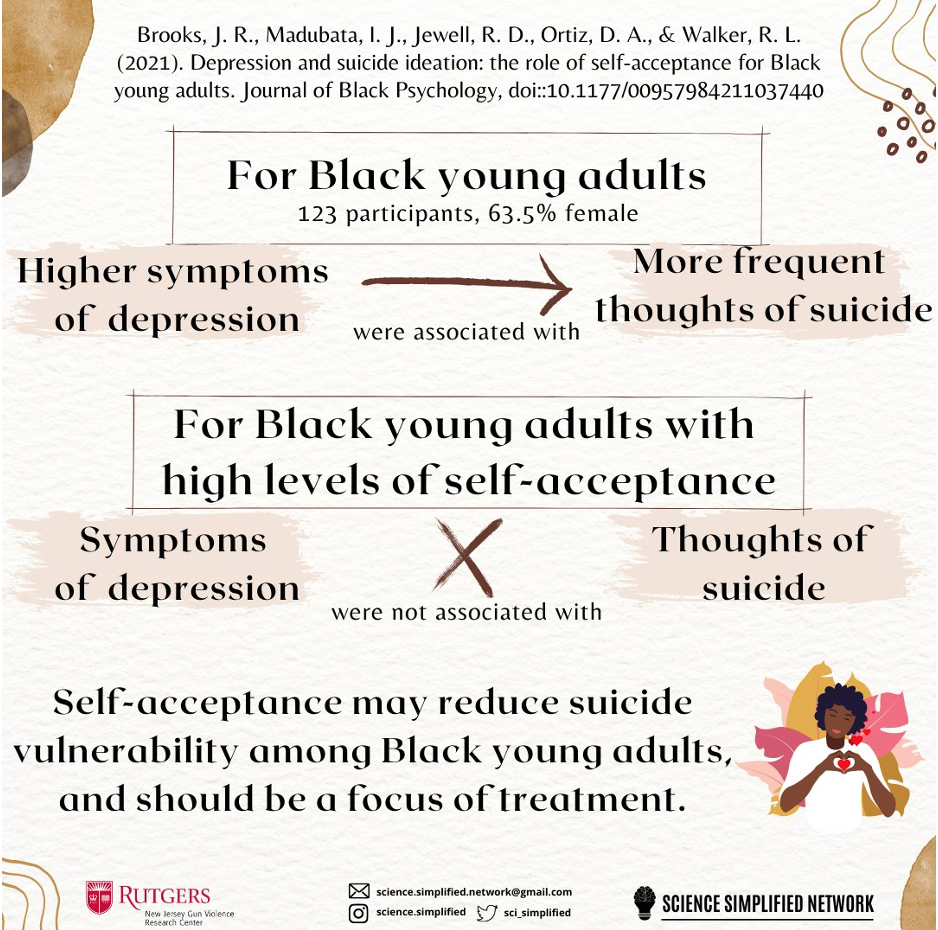There is a myth, which often exists across communities, that Black people do not die by suicide. Anecdotal explorations of suicide, almost 30 years ago, reveal that African Americans view suicide as “a White thing” (Early & Akers, 1993). Due to a myriad of long-standing cultural values that resist suicidal behavior, and encourage resilience, spirituality, and ethnic pride, Black Americans have consistently been seen to be “protected” from suicide (Walker et al., 2006). Although historically Black Americans have demonstrated lower rates of suicide compared to other racial/ethnic groups, this is changing.

Suicide among Black Americans is a national public health crisis, particularly for Black youth and young adults (Congressional Black Caucus, 2019). Over the past decade, the suicide rate has risen approximately 35% for Black young adults ages 15-24, and is now the second leading cause of death for this demographic (Centers for Disease Control and Prevention Web Based Injury Statistics Query and Reporting System [CDC WISQARS], 2019). Given the increased suicide rate among Black young adults, there is an even greater need to understand suicide risk and resilience factors for this population.
Prior explorations of suicide ideation and behavior have long considered depression as a risk factor. However, Black Americans are often underrepresented in these studies. Further, few studies have explored the relationship between self-acceptance, depression, and suicide risk among Black Americans. Thus, the purpose of the current study was two-fold: 1) to investigate the association of depressive symptoms and suicide ideation, and 2) to examine the potential moderating effect of self-acceptance, for Black young adults.
In this study, we found that elevated symptoms of depression were associated with increased suicide ideation. Potential explanations for this association include diminished psychological functioning (i.e., impaired coping skills; Nrugham et al., 2012) and underlying cognitive mechanisms such as hopelessness or rumination (Abramson et al., 2007). Particularly for Black adults, racism-related stressors may also exacerbate depressive symptoms and, subsequently, suicide risk (Walker et al., 2014).
Additionally, results from this study showed that perceived self-acceptance moderated the association between depressive symptoms and suicide ideation. More specifically, for individuals who reported higher self-acceptance, symptoms of depression were not associated with thoughts of suicide. This finding suggests that self-acceptance, or holding positive and realistic attitudes towards the self, may be an important dimension of one’s self-concept and protect against factors that may invoke psychological distress.
The current study has notable clinical implications. Clinically, study findings suggest that self-acceptance should be an important focus of treatment (e.g., strengths-based approaches), particularly for interventions aimed at reducing suicide among Black adults. For example, psychotherapists may highlight self-acceptance and its benefits to increase feelings of self-worth for Black patients and clients.
The current study is an important step towards 1) increasing our understanding of suicide risk and resilience among Black adults and 2) encouraging the implementation of race-conscious and culturally mindful therapeutic approaches. Please see the below infographic for an additional summary of key findings:

Reference Article
Brooks, J. R., Madubata, I. J., Jewell, R. D., Ortiz, D. A., & Walker, R. L. (2021). Depression and suicide ideation: The role of self-acceptance for Black young adults. Journal of Black Psychology. https://doi.org/10.1177/00957984211037440
Discussion Questions
- How would you define self-acceptance? What factors do you believe contribute to self-acceptance?
- As clinicians, what strategies can we utilize to foster self-acceptance among racial/ethnic minority clients?
- How might strategies for promoting self-acceptance with Black clients differ across the lifespan?
- What additional factors are important to consider to best address suicide within Black communities?
About the Author

Jasmin R. Brooks, M.A. is a doctoral candidate in Clinical Psychology at the University of Houston. Her research interests include evaluating how sociocultural risk (e.g., racial discrimination) and protective (e.g., mindfulness, racial identity) factors influence suicidality and mental health for Black populations. She aims to apply her research to the development of clinical interventions that reduce racial stress and promote psychological well-being within Black and other marginalized communities. Jasmin also maintains a strong commitment to being active in her community through mentoring, non-profit work, and creating a podcast, We Had the Talk.
If you are interested in learning more about Jasmin’s work please visit her website at: https://jasminbrooks.com/, follow her on Twitter at: @__JasminBrooks, or email her at [email protected].
References Cited
Abramson, L. Y., Alloy, L. B., Hogan, M. E., Whitehouse, W. G., Gibb, B. E., Hankin, B. L., & Cornette, M. M. (2002). The hopelessness theory of suicidality. In Suicide science (pp. 17-32). Springer, Boston, MA.
Centers for Disease Control and Prevention (CDC), National Center for Injury Prevention and Control Data & Statistics Fatal Injury Report. (2018). Web-Based Injury Statistics Query and Reporting System (WISQARS).
Congressional Black Caucus. (2019). Ring the alarm: The crisis of black youth suicide in America. Washington, DC.
Early, K. E., & Akers, R. L. (1993). “It’s a white thing”: An exploration of beliefs about suicide in the African‐American community. Deviant Behavior, 14(4), 277-296.
Nrugham, L., Holen, A., & Sund, A. M. (2012). Suicide attempters and repeaters: Depression and coping a prospective study of early adolescents followed up as young adults. The Journal of Nervous and Mental Disease, 200(3), 197-203.
Walker, R. L., Lester, D., & Joe, S. (2006). Lay theories of suicide: An examination of culturally relevant suicide beliefs and attributions among African Americans and European Americans. Journal of Black Psychology, 32(3), 320-334.
Walker, R. L., Salami, T. K., Carter, S. E., & Flowers, K. (2014). Perceived racism and suicide ideation: Mediating role of depression but moderating role of religiosity among African American adults. Suicide and Life‐Threatening Behavior, 44(5), 548-559.
Interested in submitting a blog post?
Link HERE to download the SCP Blog Submission Form
